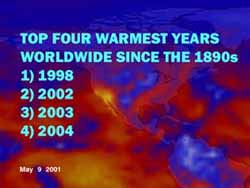
A surprising link may exist between ocean fertility and air pollution over land, according to Georgia Institute of Technology research reported in the Feb. 16 issue of the Journal of Geophysical Research — Atmospheres. The work provides new insight into the role that ocean fertility plays in the complex cycle involving carbon dioxide and other greenhouse gases in global warming.
When dust storms pass over industrialized areas, they can pick up sulfur dioxide, an acidic trace gas e

Study in Science may help change the broad understanding of how they are formed
Researchers at Scripps Institution of Oceanography at the University of California, San Diego, have produced new findings that may help alter commonly held beliefs about how chains of undersea mountains formed by volcanoes, or “seamounts,” are created. Such mountains can rise thousands of feet off the ocean floor in chains that span thousands of miles across the ocean.
Since the mid-20th centu
Researchers at Oregon State University, NASA and other institutions announced today the discovery of a method to determine from outer space the productivity of marine phytoplankton – a breakthrough that may provide a new understanding of life in the world’s oceans.
Phytoplankton are the incredibly abundant microscopic plant forms that provide the basis for most of the marine food chain, half the oxygen in our atmosphere and ultimately much of the life on Earth. They have
Chemicals found in whale blubber, and initially suspected of being from industrial sources, have turned out to be naturally occurring, raising questions about the accumulation of both natural and industrial compounds in marine life.
A new study in the journal Science by researchers Emma Teuten, Li Xu, and Christopher Reddy at the Woods Hole Oceanographic Institution (WHOI) is causing researchers to rethink the sources and fates of many chemical compounds in the environment.
A new study of climate in the Northern Hemisphere for the past 2000 years shows that natural climate change may be larger than generally thought. This is displayed in results from scientists at the Stockholm University, made in cooperation with Russian scientists, which are published in Nature on 10 Feb 2005.
The most widespread picture of climate variability in the last millennium suggests that only small changes occurred before the year 1900, and then a pronounced warming set in

Last year was the fourth warmest year on average for our planet since the late 1800s, according to NASA scientists.
To determine if the Earth is warming or cooling, scientists look at average temperatures. To get an “average” temperature, scientists take the warmest and the coolest temperatures in a day, and calculate the temperature that is exactly in the middle of those high and low values. This provides an average temperature for a day. These average temperatures are then ca